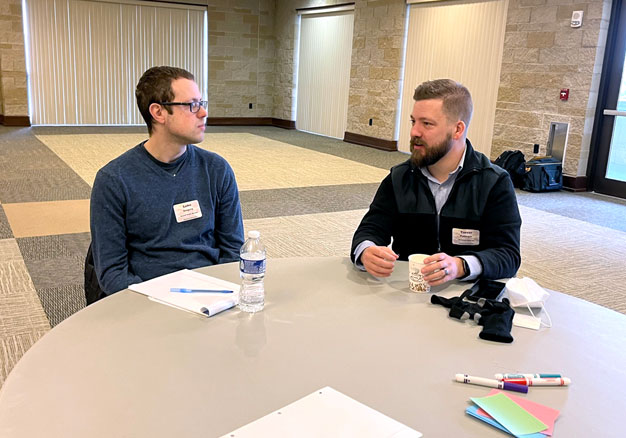
Lay faith formers Luke Gregory of Newton and Trevor Pullinger of Keokuk participate in an exercise during the “Catholic Faith Formation in a Post-Pandemic World” series kick-off last month in Iowa City. The second session in the series took place online and focused on youth and family faith formation.
By Lindsay Steele
The Catholic Messenger
Ministry is never going to be the same because of the COVID-19 pandemic, speaker Catherine “Catzel” LaVecchia told a group of faith formers over Zoom. “We have to accept and grow with that.”
This significant challenge offers parishes the opportunity to make a transformation that will bring more people into the fullness of the faith, said LaVecchia, who leads lifelong faith formation in a New Jersey parish of 4,800 families. During the March 10 webinar, she offered faith formers in Iowa tools for transforming youth and family faith-formation programs. The webinar was part of the Diocese of Davenport Office of Faith Formation’s ongoing series, “Catholic Faith Formation in a Post-Pandemic World.”
Don Boucher, diocesan director of Faith Formation, opened the webinar with a prayer, thanking God for the opportunity to “learn and grow in our ministry.” He also asked God to watch over the people in Ukraine. “Hold them in the palm of your hand as they experience and deal with this assault on their lives.”
The group of faith formers first reflected on the message of hospitality that presenter Jane Angha shared during the kick-off session last month at St. Patrick Parish in Iowa City. Hospitality is vital to all aspects of parish life, commented Luke Gregory, director of Rite of Christian Initiation of Adults (RCIA), Lifelong Faith Formation and Senior High Youth Ministry for Sacred Heart Parish in Newton. “It’s about making people feel loved and accepted no matter where they’re at,” LaVecchia added. “If people walk into Mass or a program and feel instantly welcomed, loved, cared for or noticed they’re going to want to belong. That’s important to keep in mind, especially when people are new. Get to know their names and get to know them so they feel seen. Then… hopefully we’ll get a chance to help them in their faith.”
Because of the pandemic, parishes have had to expand their vision of faith formation. “We’ve had to find a way outside of just our church buildings and parish centers, offering different approaches that work for (people’s) lives,” LaVecchia said.
Parishes now have a choice: go back to the way things were or “listen to the needs of the people and their situations, and discern how to respond to this new context and develop new and innovative faith formation content and approaches.”
She asked the faith formers to consider the following questions:
Why do we do what we do?
What do we want to let go of?
What do we want to keep?
What can we re-invent?
How can we move programs into the future?
What do we need to do to build capacity for faith formation with families?
The final question addressed the idea that youths learn best when their families are involved in the process. Faith formation “is way more than just spouting out what the Church teaches. It should be about learning faith practices” and incorporating those at home.
Family-oriented faith formation can help parents see their role as primary educators of the faith. “Not all parents feel comfortable in that role, but they are in that role and they have to know how to claim that and feel comfortable in that.” At LaVecchia’s parish, a monthly, in-person family program incorporates parents into the faith formation process. The parish offers the program at different times to accommodate busy schedules.
“The work of the Church with the family is to equip them with resources, partner with and support them,” whether the programming is online, in-person or a combination of both, she said.
The series will continue March 24 from 10-11:30 a.m. with a webinar, Designing Adult Faith Formation for the Post-Pandemic World. A webinar on adolescent faith formation will take place April 7. The series will conclude with an in-person workshop on April 28 at St. Patrick Parish in Iowa City. Individuals and parish groups may sign up at https://www.davenportdiocese.org/cff-series. Interested persons who missed the first workshop and webinar but would like access to the recordings can do so by registering for the entire series at the link above.











